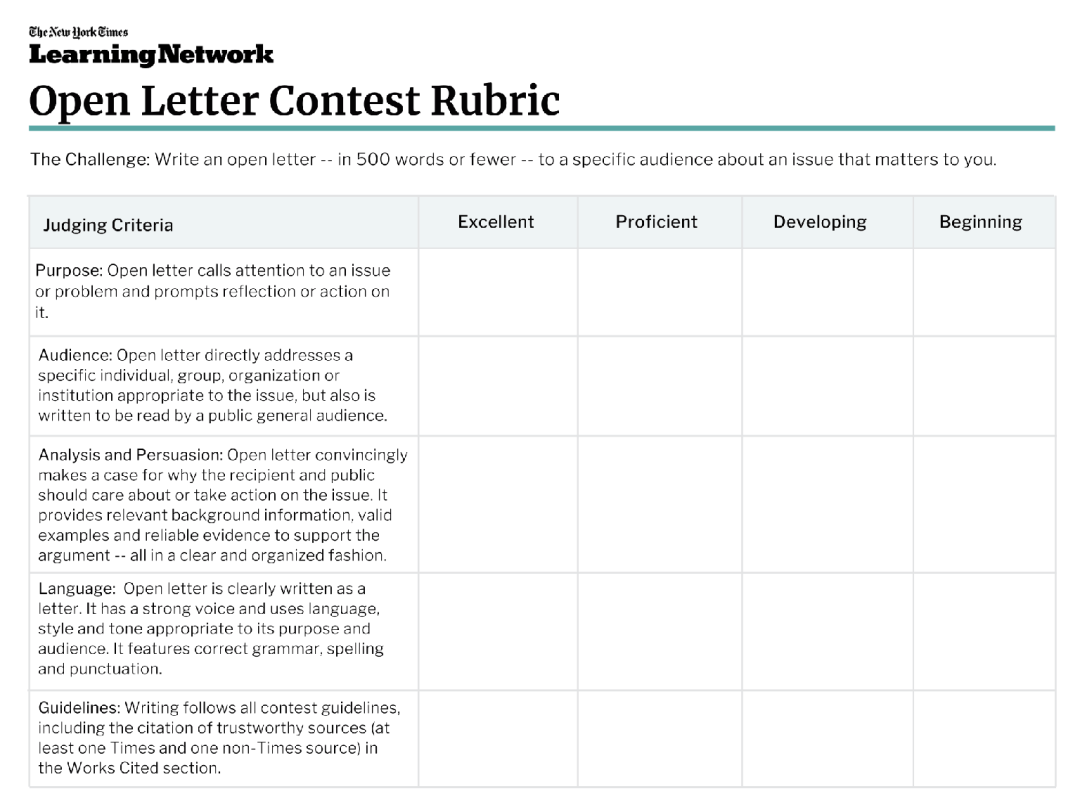若你正在寻找新鲜的阅读、观看、游玩、聆听、穿戴、品尝或探访之选,无需再寻。以下是我们第八届年度学生评论大赛的入围作品,该活动邀请青少年担任评论家,针对《纽约时报》所涵盖的各类创意表达撰写原创评论。
我们收到了来自世界各地青少年的近4000份投稿,并选出了数十位入围选手。
感谢所有参与者的支持。
The Cafe: Where the Cool Kids Go
Breath of the Wild: A Gamer’s Cookie Jar
‘Samsara’: Look Into a Kaleidoscope and See Yourself
‘Amy and Isabelle’: A Quietly Subversive Masterpiece
Celestial Ceilings, Convoluted Chronicles and Celebrated Cities: Behind the Grand Central Station Constellation Mural
‘Everything Everywhere All at Once’: When Too Much Is Just Enough
Balenciaga’s 2023 Spring/Summer Line: Dull as Mud?
Junji Ito’s ‘The Enigma of Amigara Fault’: Contorted by Conformity
War at Its Most Pointless: ‘All Quiet on the Western Front’
All Finalists
Winners
Amy Liu, 17, Developing Virtue Secondary School, Ukiah, Calif.: “‘Samsara’: Look Into a Kaleidoscope and See Yourself”
Audrey He, 17, Plano West Senior High School, Plano, Texas: “‘Amy and Isabelle’: A Quietly Subversive Masterpiece”
Caridee Chau, 15, Shanghai American School, Shanghai: “Junji Ito’s ‘The Enigma of Amigara Fault’: Contorted by Conformity”
Chloe Shannon Wong, 16, Arcadia High School, Arcadia, Calif.: “The Cafe: Where the Cool Kids Go”
Gabriel Kantor, 15, Jackson Hole High School, Jackson, Wyo.: “Breath of the Wild: A Gamer’s Cookie Jar”
Kaixin Cassie Zheng, 14, Shanghai American School, Shanghai: “Balenciaga’s 2023 Spring/Summer Line: Dull as Mud?”
Orion Elfant Rea, 15, Morro Bay High School, Morro Bay, Calif.: “War at Its Most Pointless: ‘All Quiet on the Western Front’”
Sam Johar, 17, Hunter College High School, New York, N.Y.: “Celestial Ceilings, Convoluted Chronicles and Celebrated Cities: Behind the Grand Central Station Constellation Mural”
Thy Luong, 16, Notre Dame High School, San Jose, Calif.: “‘Everything Everywhere All at Once’: When Too Much Is Just Enough”
_________
Runners-Up
Cheryl Chen, 15, Havergal College, Toronto: “‘Kill Your Darlings’: A Literary and Spiritual Revolution”
Eleanor Loeper-Viti, 16, Tower Hill School, Wilmington, Del.: “‘The Invisible Life of Addie LaRue’: Stunning Writing With Little Depth”
Elisabeth Nelson, 14, The Meadowbrook School of Weston, Concord, Mass.: “No More Teachers, No More Books? Not at ‘Abbott Elementary’”
Gwen Bradwell, 16, The Baldwin School, Philadelphia: “Paradise Lost in a Greying Thought”
Hailey Zhang, 15, Cary Academy, Cary, N.C.: “It’s Chaotic, It’s Relatable, It’s ‘Everything Everywhere All at Once’”
Hannah Morley, 15, Hoboken High School, Hoboken, N.J.: “A Fiddler on the Roof. Meshuge, Neyn?”
Henry Weinschel, 16, Roslyn High School, Roslyn Heights, N.Y.: “Fish!, Borough Market, London”
Josha Partin, 17, Sayre School, Lexington, Ky.: “The Heartwarming Impact of Representation”
Julia Abu, 15, Victory Christian International School, Pasig, Metro Manila, Philippines: “Taylor Swift’s ‘Midnights’ Proves She’s a Mastermind”
McKenzie Shagena, 16, Port Huron Northern High School, Port Huron, Mich.: “‘Boy Erased’: The Realities of Being L.G.B.T.Q. in the South”
Michael Gan, 16, Dulwich College Shanghai Pudong, Shanghai: “Columbia Circle Regenerated — The Timelessness of Architecture”
Pavithra Iyer, 16, Sunset High School, Portland, Ore.: “‘Derry Girls’: An Ardent Celebration of Joy”
Riya Kommineni, 16, Greenhill School, Dallas, Texas: “Sofia Coppola’s ‘The Virgin Suicides’: A Stunning Vignette on Eternal Girlhood”
Tiffany Chan, 15, Botany Downs Secondary College, East Tāmaki Heights, Auckland, New Zealand: “‘The Farewell’: To Tell or Not to Tell”
Vivian Palmer, 17, The Baldwin School, Radnor, Pa.: “‘The Carrying’: ‘Inherently, Wonderfully, Unapologetically Human’”
_________
Honorable Mentions
Alexander Kruschka, 17, Arrowhead High School, Hartland, Wis.: “Frostpunk: A Beautiful Steampunk City Builder”
Amaidhiameya Ilangovan-Arya, 16, West Windsor-Plainsboro High School South, N.J.: “‘The Hurting Kind’: An Unprecedented Triumph”
Amanda Fernandez, 17, Jose Marti STEM Academy, Union City, N.J.: “Motion Picture Masterpiece: ‘The Red Shoes’”
Angelina Xie, 17, The Bronx High School of Science, Bronx, N.Y.: “‘Moxie’: Oh, Girl …”
Charlotte Levy, 15, Mira Costa High School, Manhattan Beach, Calif.: “‘Jeopardy!’: Maybe Your Grandparents Were On to Something”
Charlotte M. Melroy, 15, John T. Hoggard High School, Wilmington, N.C.: “‘Fleabag’: A Desperate Love Letter to Sisters”
Chuying Huo, 16, London Central Secondary School, London, Ontario: “‘Persuasion’ Persuaded Me to Stay Far Away From Netflix’s Austen Adaptations”
Emma Yao, 17, University Hill Secondary School, Vancouver, British Columbia: “Curating Authenticity in the Name of BeingReal”
Emma Yookyung Na, 17, Sage Creek High School, Carlsbad, Calif.: “‘Minari’ and the Collective Memory of American Immigration”
Erin Harding, 16, NUAMES High School, Layton, Utah: “A Hard Day’s (Moon) Knight”
Gloria Badibanga, 13, Roberto W. Clemente Middle School, Germantown, Md.: “‘Everfair’ Makes Its Mark in the World of Steampunk Afrofuturism”
Jeremiah Chung, 18, Hunter College High School, New York, N.Y.: “Novel Tradition: Gaonurri’s Fresh Take on Classic Cuisine”
Kyo Lee, 15, Laurel Heights Secondary School, Ontario, Canada: “‘Jigsaw’: An Ingenious Mélange of Comedy and Commentary”
Lucy Nelson, 16, Glen Ridge High School, Glen Ridge, N.J.: “Rated One Star(buck)”
Mahika Bhatt, 18, Woodgrove High School, Purcellville, Va.: “‘Never Have I Ever,’ and No One Ever Should”
Miller Roberts, 16, Westlake High School, Austin, Texas: “‘Rise’: A Recipe for Scoring in Basketball — Mix Love With Hope and Determination”
Natalie Houlton, 16, Guilford High School, Guilford, Conn.: “Lizzy McAlpine Will Grab Your Attention in ‘Five Seconds Flat’”
Nicola Pak, 15, United World College of South East Asia, Singapore: “The Liar and the Lover: Why ‘These Violent Delights’ Should Be on Your Bookshelf”
Trisha Iyer, 16, The Harker School, Cupertino, Calif.: “In ‘Guo Pei: Couture Fantasy,’ Enter the World of a Fashion Star”
Sophie Zhou, 15, Stuyvesant High School, New York, N.Y.: “New World Mall Food Court: A Chaotic Wonderland of East Asian Comfort Food”
Rajeshwari Rawal, 16, Middleton High School, Middleton, Wis.: “Madeline Miller’s ‘Circe’: A Bewitching Spin on One of Literature’s Most Iconic Tales”
Ryan Choe, 16, Jupiter Community High School, Jupiter, Fla.: “The Idler Wheel Is Wiser Than the Driver of the Screw and a Fiona Apple Re-Listen Will Greatly Service You”
Savina Williams, 17, Coronado High School, Scottsdale, Ariz.: “Insatiable? I’d Rather Be Satisfied.”
Sylvie Schrader, 17, Port Huron Northern High School, Port Huron, Mich.: “‘A Place of Greater Safety’: Six Feet Under, With Your Head in a Basket”
Tara Isabel Dee Lago, 17, Staten Island Technical High School, Staten Island, N.Y.: “‘Koisenu Futari’: An Aromantic Asexual Take on a Happy Family”
William Schreiber, 17, Kirkwood High School, Kirkwood, Mo.: “‘Wednesday’ Is Bizarre Gen Z Bliss”
Yoonsa Lee, 15, Deerfield Academy, Amherst, Mass.: “‘Whisper of the Heart’: Studio Ghibli’s Ode to the Artistic Process”
Yuanheng Yue, 16, The World Foreign Language Academy, Shanghai: “Love Is a Silent Expression”
Yutong Wu, The Experimental High School Attached to Beijing Normal University, Beijing: “Forget Me Not Café: Memories May Be Forgotten But Warmth Not”







